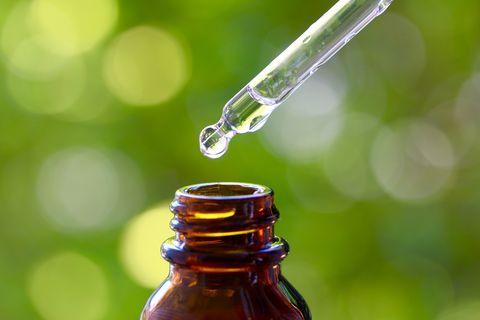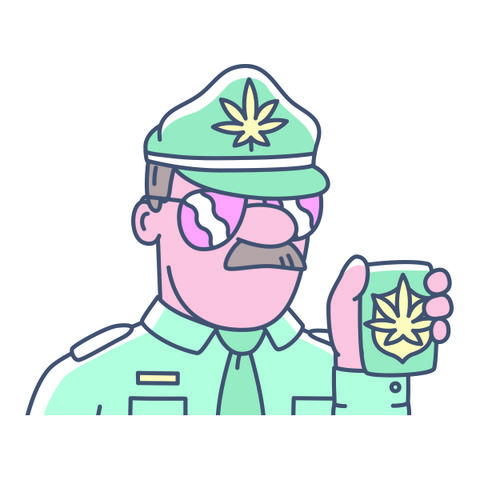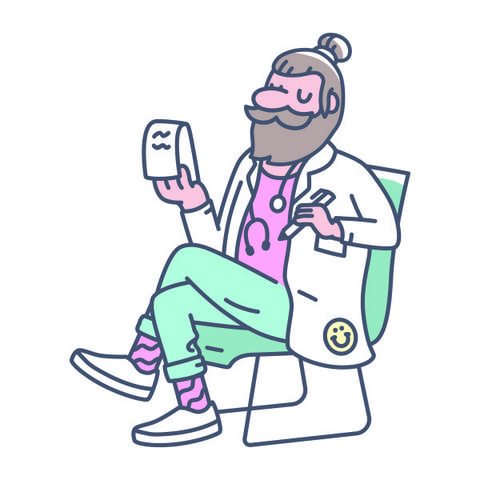
While training for a triathlon back in 2009, Kristen Brooks flew over her handlebars. For years afterward, she couldn’t run, ski, or hike without neck or back pain.
Cortisone shots and acupuncture didn’t provide relief, so when the now 41-year-old’s best friend said she was going to try a topical cream containing cannabidiol—CBD, a compound found in marijuana—to ease her own aches, Brooks figured: Why not join her?
Within two months, her discomfort was gone. “It felt like witchcraft,” she says.
The health benefits of CBD have nothing to do with voodoo
But CBD has some seemingly powerful mojo. Unlike THC—the psychoactive component in a classic joint or weed brownie—it won’t get you high. Yet it may help regulate mood and chronic pain, and reduce inflammation.

Michael Young
“CBD is an extraordinary compound,” says Sanford Wolgel, Ph.D., former chief science officer at Cannabistry Labs. There’s strong evidence CBD can dial down anxiety—makes sense, since CBD seems to increase levels of your body’s natural mood-regulating compounds. A CBD-based epilepsy medication was approved by the FDA in late June, and CBD has been found to curtail inflammation in mice.
But that’s all science has proved.“The research on CBD is very early,” notes Jordan Tishler, M.D., a Harvard-trained doc who is an expert on using cannabis as medical treatment. Experts suspect some of the reported feel-good perks come down to the placebo effect (or clever marketing).
ReneeBeck, a 34-year-old who uses a CBD lotion on her feet after her half-marathon training runs, hears that. “I’m probably feeling the cooling effect more than the CBD,” she says. Still, it seems to make the pain from her foot injury more manageable, so she uses it—along with physical therapy exercises—to keep her aches in check.
CBD is no magic pill (or oil or edible or, well, you get the picture). But if you want to see if it can take the edge off your anxiety or reduce post-workout aches, you’ll have to put in some effort to find an effective product.

Michael Young
First, something you should keep in mind: CBD is illegal on a federal level.
Yes, even if you live in a state where recreational or medical marijuana is allowed. That said, the likelihood of the law coming after you for ordering CBD-spiked coffee or buying CBD creams is low.
“Technically, possessing CBD products is a federal misdemeanor—but I’m not aware of anyone who’s been charged,” says Mark A.R. Kleiman, Ph.D., a professor of public policy at New York University Marron Institute of Urban Management.

Michael Young
Another thing: Physicians can’t actually write a prescription for CBD (because of that whole not-being-legal thing), but they can recommend that you take it, and even advise a dose or a brand to look for.
It’s also not available at a pharmacy, nor is it covered buy insurance, but some insurers will let you use your health savings account (HSA) to pay for it.
Sure, CBD sounds great, but you’ve got to know what to look for.
Reefer retail has no regulator.“It’s like the Wild West out there,” says Marcel Bonn-Miller, Ph.D., a researcher at the University of Pennsylvania Perelman School of Medicine who studies cannabis. In 2017 he tested 84 CBD products and found 26 percent contained less CBD than they claimed to, while 43 percent had more.
The latter might sound scary, but high levels aren’t known to be dangerous. Too little, however, can make a product ineffective. (Oh, and 21 percent of the CBD products also contained THC, which can make you high and show up on drug tests.) Bonn-Miller also warns that some CBD products could include traces of toxic chemicals such as pesticides and heavy metals like lead or arsenic.
2.1 billion dollars: The estimated expected worth of the fledgling CBD industry by 2020.
You can try to avoid fraud and dangerous chemicals by asking the companies you’re buying from for their testing reports (third-party lab reviews that note the CBD percentage and any harmful toxins), says Sam Kamin, Ph.D., a professor of marijuana law and policy at the University of Denver.
Check out a product’s other ingredients too, says Joel Greengrass, CEO of Theramu, a company that makes CBD oils and creams. Look for emu oil or refined coconut oil; they can penetrate your skin and deliver CBD to aching muscles. Olive oil can’t do this, so products made with it are basically just very good moisturizers, says Greengrass.
Topical and edible CBD products have been researched more than stuff like vaginal suppositories that claim to ease cramps (yes, those products really do exist!), so you’re better off sticking to stuff you can swallow or slather on your skin, says Bonn-Miller.
And if you take other medications, make sure that you mention your new CBD habit to your doctor. CBD can interact with certain drugs, including benzodiazepines and anti-depressants, says Jeff Chen, M.D., director of the UCLA Cannabis Research Initiative
Illustrations for Women’s Health by Michael Young.
This article originally appeared in the September 2018 issue of Women’s Health Magazine. For more great advice, pick up a copy on newsstands now.
Source: Read Full Article
